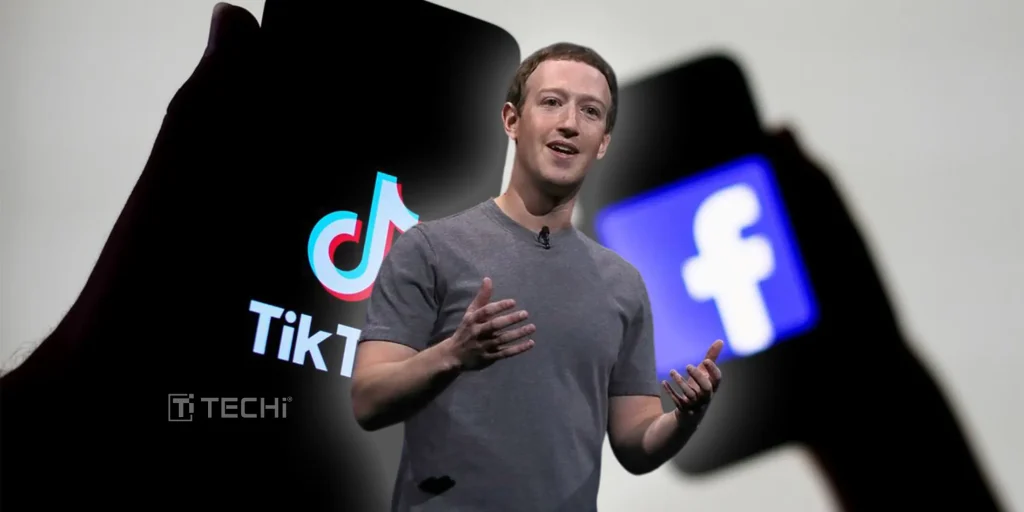
You don’t get to hear every day a tech giant confessing that it’s being schooled by the new kid on the block, but that’s precisely what just went down in a court filing. Meta, the parent company of Facebook and Instagram, accidentally exposed its social media vulnerabilities, and spoiler alert, that’s all related to TikTok. In a bitter twist of irony, the very documents intended to demonstrate Meta’s monopoly instead uncover its existential fear of being out-memed and outdone.
A newly released court filing from the U.S Federal Trade Commission’s antitrust lawsuit against Meta shows a surprising revelation that Meta leadership, including CEO Mark Zuckerberg and Instagram’s Chief Adam Mosseri, thought TikTokhad outpaced the company, and by more than just a little bit.
Facebook is considered a dying champion, with TikTok starring in the world of short-form video. The internal chat about Meta dating back to February 2022, documents high-profile Meta executives openly discussing Facebook’s diminishing arc and TikTok’s glorious ascent. Zuckerberg in that message called Facebook a “challenger that has lost the mindshare and momentum”. Mosseri of Instagram agreed, adding,
“The most natural differentiated … strategy for Facebook is to be the default discovery surface. But it’s interesting that TikTok is 100% video and beating us badly.”
TikTok’s Edge in the Social Space
The filings noted how TikTok’s highly engaging feed-based share content model became a competitor for users against Facebook and Instagram in a rapid trend. Zuckerberg said, it gives you a “feeling of shared context.” One assumes that their friends have seen the same memes and videos, it’s very social and gives a shared experience feeling.
Mosseri also warned about a wider trend whereby TikTok was not merely corroding shares away from Facebook but is also claiming shares from YouTube, Netflix, and long-form video in general. Mosseri wrote,
“My guess is they’re growing the social mobile market and eating into TV, long-form video, Netflix as well.”
Numbers Validating
TikTok outpaced YouTube in average U.S watch time as early as 2021. More recently, a report by Qustodio in 2023 discovered that 4 to 18 year-old users spent 60% more time on TikTok compared to YouTube. Even Netflix seems to be getting the squeeze, introducing its own TikTok style vertical video feed to maintain user interest, further demonstrating the platform-wide effects of TikTok’s format innovation.
Trial Impact
The court filing was designed to aid the FTC’s allegation that Meta developed a social networking monopoly that can harm the argument instead. The paper creates a visual image of a tech giant stumbling on its defense, falling behind in engagement, relevance, and innovation. Zuckerberg added that even though Facebook’s daily user base, despite its size, was no longer dominating the time spent and the primary measure of user engagement.
Other Meta leaders were citing TikTok’s dominant algorithm and feedback loops of content as primary differentiators that Meta was still having trouble reproducing. The CEO explained,
“That makes it inherently social because instead of having to send some content to a friend, you can just assume they’ve seen it. If we could get to a level like this with topics and unconnected content on FB, that would be great. “
A Landscape with Crumbling Dominance
WhatsApp head Will Cathcart and ex VP Stan Chudnovsky, both recognized TikTok’s niche targeting power and the growing fragmentation of social media. From Snap and YouTube to Discord and iMessage, consumers now have a buffet of apps contending for their screen time. Chudnovsky added that,
“Just adding a new format (like we did with Stories) is not enough anymore. There are just so many other places for people to be”.
John Hegeman, who was VP of ads at the time and is now Meta’s CRO, admitted TikTok was “clearly in the lead” in short-form video, but he hoped Meta could close the gap through content partnerships. Nevertheless, he pointed to weaknesses in Meta’s trailing in core technologies such as machine learning and creator tools.
Meta’s Identity for Future
The larger context of the document is that Meta perceives itself less as a market giant and more as an underdog attempting to fight back into the picture. That internal acknowledgement of competitive pressure, even with Meta’s Instagram and WhatsApp acquisitions, could be a central area of dispute in court. Zuckerberg himself recently testified that TikTok had slowed Meta’s growth considerably and described its emergence as a major risk to the future of the company. With TikTok breaking new ground and regulators paying close attention, Meta’s next step could determine if it can regain dominance or stay in catch-up mode.
This post was originally published on this site be sure to check out more of their content







